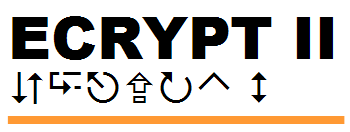NaCl: Networking and Cryptography library

Computer Aided Cryptography Engineering

ECRYPT II
NaCl: Networking and Cryptography library |
 Computer Aided Cryptography Engineering |
 ECRYPT II |
|
Secret-key message authentication: crypto_authC++ interfaceC++ NaCl provides a crypto_auth function callable as follows:
#include "crypto_auth.h"
std::string k;
std::string m;
std::string a;
a = crypto_auth(m,k);
The crypto_auth function authenticates a message m using a secret key k. The function returns an authenticator a. The authenticator length is always crypto_auth_BYTES. The function raises an exception if k.size() is not crypto_auth_KEYBYTES. C++ NaCl also provides a crypto_auth_verify function callable as follows:
#include "crypto_auth.h"
std::string k;
std::string m;
std::string a;
crypto_auth_verify(a,m,k);
The crypto_auth_verify function checks that k.size() is crypto_auth_KEYBYTES; a.size() is crypto_auth_BYTES; and a is a correct authenticator of a message m under the secret key k. If any of these checks fail, the function raises an exception.
C interfaceC NaCl provides a crypto_auth function callable as follows:
#include "crypto_auth.h"
const unsigned char k[crypto_auth_KEYBYTES];
const unsigned char m[...]; unsigned long long mlen;
unsigned char a[crypto_auth_BYTES];
crypto_auth(a,m,mlen,k);
The crypto_auth function authenticates a message m[0], m[1], ..., m[mlen-1] using a secret key k[0], k[1], ..., k[crypto_auth_KEYBYTES-1]. The crypto_auth function puts the authenticator into a[0], a[1], ..., a[crypto_auth_BYTES-1]. It then returns 0. C NaCl also provides a crypto_auth_verify function callable as follows:
#include "crypto_auth.h"
const unsigned char k[crypto_auth_KEYBYTES];
const unsigned char m[...]; unsigned long long mlen;
const unsigned char a[crypto_auth_BYTES];
crypto_auth_verify(a,m,mlen,k);
The crypto_auth_verify function returns 0 if a[0], ..., a[crypto_auth_BYTES-1] is a correct authenticator of a message m[0], m[1], ..., m[mlen-1] under a secret key k[0], k[1], ..., k[crypto_auth_KEYBYTES-1]. Otherwise crypto_auth_verify returns -1.
Security modelThe crypto_auth function, viewed as a function of the message for a uniform random key, is designed to meet the standard notion of unforgeability. This means that an attacker cannot find authenticators for any messages not authenticated by the sender, even if the attacker has adaptively influenced the messages authenticated by the sender. For a formal definition see, e.g., Section 2.4 of Bellare, Kilian, and Rogaway, "The security of the cipher block chaining message authentication code," Journal of Computer and System Sciences 61 (2000), 362–399; http://www-cse.ucsd.edu/~mihir/papers/cbc.html.NaCl does not make any promises regarding "strong" unforgeability; perhaps one valid authenticator can be converted into another valid authenticator for the same message. NaCl also does not make any promises regarding "truncated unforgeability." See Validation regarding safe message lengths. Selected primitivecrypto_auth is currently an implementation of HMAC-SHA-512-256, i.e., the first 256 bits of HMAC-SHA-512. HMAC-SHA-512-256 is conjectured to meet the standard notion of unforgeability.
Alternate primitivesNaCl supports the following secret-key authentication functions:
VersionThis is version 2019.03.19 of the auth.html web page. |